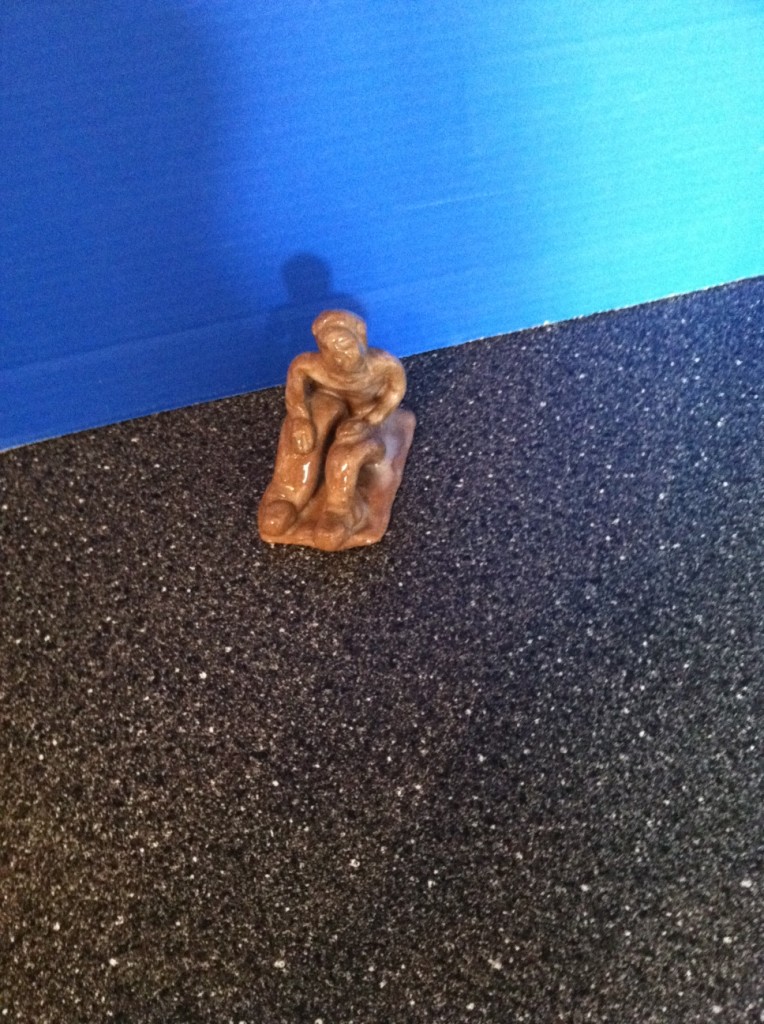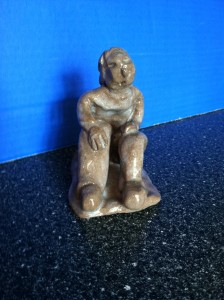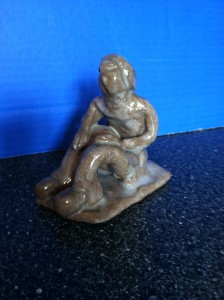As I mentioned in the first Collaborations With My Grandmother, my grandma Anne Kupperberg was an artist who left behind many wonderful pieces of her work with members of her family. Though primarily a painter, after losing her eyesight to macular degeneration she took up sculpting in clay and soapstone. The story that follows is inspired by one of those pieces:
Unburdened
After the break-up of his marriage, Jack felt as though a great weight had been lifted from his shoulders. It wasn’t that his ex was a bad person or that their marriage had been particularly horrible. They had simply grown apart over the course of two and a half decades and three children and stopped having anything in common. It surprised neither of them when she woke up one morning and told him that she didn’t think she could go on playing at life as though nothing was wrong anymore. He couldn’t think of a convincing counter argument, so three months later, the house was on the market and their lawyers were trying to complicate the straightforward agreement they had already worked out between themselves:
What’s yours is yours and what’s mine is mine, the rest we divide down the middle.
Their youngest was in her second year of college, and all three understood immediately when their parents sat down and broke the news to them. Jack suspected the kids may have even been a little relieved, having sensed the growing distance between their mother and father before they themselves recognized the problem. Relations had been cordial and, while fights were few, deep, simmering silences could go on for weeks at a stretch. “Ask your mother…” and “Please tell your father…” became the prefixes of anger the kids heard more and more on their visits home. Something had to give. Eventually, it was her.
And then he had what was his and it was all going into boxes for movers to bring somewhere else, an apartment or a condo, one likely to be too small to accommodate his vast horde of … stuff. His ex called it “junk,” his friends called it a “collection.” He couldn’t say whether or not it was junk, but it was all too eclectic and random an assortment of objects and ephemera to be any proper kind of collection.
He liked to think of himself as an accumulator. By far, the largest accumulation was of books, thousands and thousands of old and musty paperback editions bought in bulk at flea markets and library and garage sales over the years. He read some, but mostly he liked them for the covers, those 1950s miniature masterpieces of the lurid, sensational, sexy, fantastical, and horrible. Then came the CDs, five thousand of them, easy, on shelves, in hallways, boxed and shoved in the garage and closets; and the magazines, endless neatly tied bundles of Time, Newsweek, People, Boys Life, and two dozen other titles of publications long deceased, and newspapers, multiple copies of different papers headlining the significant events of his lifetime; the figurines of advertising characters, like Nipper the RCA dog, the Pillsbury Dough Boy, Big Boy, Reddy Kilowatt, the Michelin Tire Man; there were, he found, almost thirty antique shaving mugs in various locations throughout the house, as well as hundreds of copies of sheet music from the 1920s onward, a carton of hand puppets, somewhere in the vicinity of two hundred Pez dispensers, a shoebox of advertising swizzle sticks in interesting shapes, two years worth of Sad Sack comic books from the mid-1960s, at least eight sets of screwdrivers, nine hammers, twenty-three cans of unsorted nails and screws, eleven wrenches, and crowbars in seventeen different sizes. He found bulging baggies of political and gag buttons and pins. He found office supplies sufficient to stock a mid-sized brokerage firm, including enough notepads to copy out Moby Dick and the complete works of Dickens, Proust, Tolstoy, and Dostoyevsky several times over. He pulled boxes from the attic containing toys and games from his childhood and those of the kids. He owned G.I.Joes and all the uniforms and accessories, including a jeep, a diving bell, and a Gemini space capsule. He had 1950s promotional bar trays featuring all the popular beers of the era, Schlitz and Piels and Black Label, as well as commemorative shot glasses and bottle openers. He had … so much to carry.
But now, he had enough. Why had he held on to all of this … stuff? Most of it was boxed, tied, or wrapped, put away in some dim, dark corner under yet more stuff and hadn’t been looked at or touched for years; vast quantities of his possessions he didn’t even remember he possessed. What was the point in having a thing if the thing was had only to be shoved away into some dark corner and forgotten?
Jack rented a dumpster. He had relinquished the weight of his failed marriage by divorce. Now the challenge was to give up the weight of the empty life he tried filling with all this stuff. But standing there among the accumulated piles and stacks of his emotional debris, he didn’t know how he could do it. Was he simply throwing out some garbage or tossing his entire life on the trash heap?
“Fuck it!” he said, and heaved a bundle of newspapers from Nixon’s resignation in 1973 into the dumpster. After the first one, it got easier. Each box or bundle or bag that found its way into the dumpster was one less thing that Jack had to worry about in life going forward.
He contacted several dealers he knew in books, toys, memorabilia, and music He showed them what he had and accepted their best offers and a helping hand to load it into their trucks and vans and take it away. What he couldn’t sell joined the rest of the garbage in the dumpster. He went through his closets and drawers and started filling black plastic trash bags with the clothing he owned but hadn’t worn in years and gave it all to Goodwill. He considered the furniture he was taking and the kitchen utensils he would need. Television had lost all interest for him once he found the responsibility of keeping track of and remembering to watch all the programs he followed too much to worry about. On radio, they played music for which he had no patience or talked endlessly about matters in which he had no interest and, as the days passed, even less understanding.
By the time he moved into his apartment, a one bedroom with a terrace in a high-rise in a nice part of town, it took two moving men less than an hour and a half to pick up and drop off all his possessions, including the twenty minute drive between his old home and the new.
An easy chair. A lamp. A pullout sofa bed. A small dining table and two chairs. A small bookcase. One box of kitchen utensils. One of books. One of bathroom supplies and toiletries. Two suitcases of clothing.
His life, reduced to the bare essentials. And he didn’t have any particular attachments to even those. In fact, it soon became evident that he had not in fact let go of enough things. Clothes had to be laundered, tables wiped, dishes washed, books read. He got rid of the books first, then the bookcase, since he no longer had anything to put in it. Jack had stopped seeing people, so the second chair at the table wasn’t necessary … indeed, what did he really need any dining set for if he could eat in his easy chair? Or, as it struck him in a revelation as he sat in the easy chair with his bowl of soup staring at the sofa bed, why clutter his life with the chair when he could sit on the sofa? And who needed a sofa bed when he could sit and sleep on the floors perfectly comfortable dark, plush carpet? And how many articles of clothing could he wear at any one time? Wear what you own, he told himself, and tossed everything but the clothes on his back down the incinerator.
With his diet whittled down to soups and stews he could heat in their cans, Jack didn’t need dishes, pots and pans, or utensils beyond a spoon and can opener. He drank only water and that he could do straight form the faucet.
With nothing left to look at in the apartment, he cancelled his electrical service and threw away his lamp. The contents of his medicine chest were, one by one, deemed non-essential and deleted until it held only a toothbrush, a straight razor, and a bar of soap. His one towel hung on the rack.
Then he was done. Everything that required care and maintenance in his life was gone. There were no more burdens for him to carry. It was just him now. Alone with his thoughts.
Until the morning he woke up on the floor and wondered how he might unburden himself of those as well.
– – – – – – – – – – – – – – – – –


